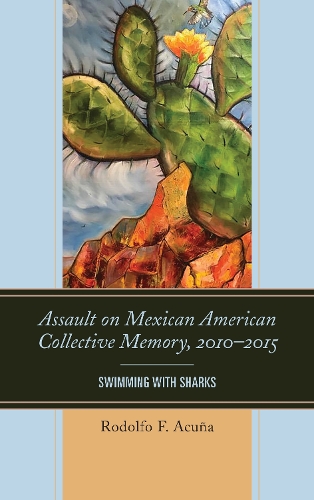
Assault on Mexican American Collective Memory, 20102015: Swimming with Sharks
(Paperback)
Available Formats
Publishing Details
Assault on Mexican American Collective Memory, 20102015: Swimming with Sharks
By (Author) Rodolfo F. Acua
Bloomsbury Publishing PLC
Lexington Books
28th May 2019
United States
Classifications
Professional and Scholarly
Non Fiction
Ethnic groups and multicultural studies
Physical Properties
Paperback
296
Width 153mm, Height 219mm, Spine 22mm
440g
Description
This book uses a micro-narrative structure to explore the assault on the collective memory of Mexican Americans in the Southwest United States from 20102016. These communities survival depends on their histories and identities, which are being quickly erased by gentrification and dispersal, neoliberalism and privatization. This issue is most apparent in the education system, where Mexican American students receive inferior educations and lack access to higher education. Avoiding the overly-theoretical macro-narrative, this book uses case studies and micro-narratives to suggest possible changes and actions to address this issue. It also explores how the erasure of Mexican Americans history and identity mirrors society as a whole.
Reviews
Acua (emer., Chicano studies, California State Univ., Northridge) organized five years of collective political writings that contextualize current events within Mexican and Latino populations in Arizona and California. His writings focus on Tucson, Arizona, ethnic studies cultural wars and various campus issues in the CSU system. The collection documents and challenges the various status quo political attacks on the Mexican and Latino population and communities. Acua contributes a strong introductory chapter that outlines the general purpose of this collection of political writings. His historical perspectives and sources, which make the book original and organic, highlight 50 years of the author's contributions to the field of Chicana/o studies. Acua's leadership is a major contribution for future research and scholarship on this critical subject. Every library should obtain a copy of this book for its ethnic studies and history collections. Summing Up: Recommended. All levels/libraries. * CHOICE *
Acuas book is a powerful counternarrative that carefully documents the struggles over Mexican American studies and the barring of Occupied America from Arizona classrooms. . . In telling these stories, Acua refuses to become mired in the politics of despair or of hope. Instead, he focuses on the challenges at hand and offers good advice: be morally outraged but disciplined; be organized and persistent. * Journal of American History *
Dr. Rodolfo F. Acua, like the late Dr. Howard Zinn, is an important and a prolific historian in academia and beyond. More specifically, hes an indispensible historian of the marginalized, the maligned and the ignored by the oppressive U.S. state. With his 1972 book publication of the classic Occupied Americaamong many other books, essays and social commentariesAcua has become one of the premier historians of the Chicana/o people. In this topical and timely book, Acua produces another exceptional, well-written and well-cited book. In his life-long efforts to recover/preserve the Chicana/o collective memory, in this must-read book, he thoroughly documents and analyzes current and past unjust attacks against Chicana/os and Mexican immigrants by racist politicians, government officials and public figures in states like Arizona, Texas and California. In doing so, Acua also sheds light on the heroic resistance and social activism by the attackedi.e., millennials, students, teachers, activists, immigrants, community members, etc.to defend their/our basic human rights, dignity and self-respect in their/our ancestral lands. -- Alvaro Huerta, California State Polytechnic University
Rodolfo F. Acua's latest book is a powerful and urgent response to the advantageous erasure and co-optation of Mexican American experiences by powers that be. At a moment when facts are made up and used to serve those deeply invested in maintaining a hierarchal order of things, Professor Acua offers us an arsenal of indisputable historical evidence we must use to fight back. -- Richard T. Rodrguez, University of California, Riverside
This is another of those amazingly far-reaching, yet full of specifics, works by the godfather of Chicana/o Studies, or as the younger scholars would say Chicanx Studies. Roaming across the terrains of labor, across state lines, beginning in the Arizona battleground for the right of Chicanx youth to know their histories, taking up the challenges of the changing face of public education, particularly the state of CAs Cal State universities (CSUN where Prof. Acua has spent the bulk of his academic career), and as we would come to expect, attending to both labor and laborers, this work walks us through key issues facing borderlands communities of color especially in public and higher education. As author and historian of many other important works, this one adds to Acuas interests and line-up of contemporary issues, Dreamers, immigration debates, and the role of fear and terror in political action. Some things have changed and others not at all, is one message running through much of this scholars work. Hope lies in historical memory and the refusal to erase the past, is another. The work functions as testimony and recording, bending toward social and political justice, educational access, and concern for the histories of Mexican-origin people across the continent. -- Deena J. Gonzlez, Loyola Marymount University
Author Bio
Rodolfo F. Acua is professor emeritus of Chicano studies at California State University, Northridge.
